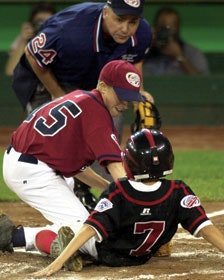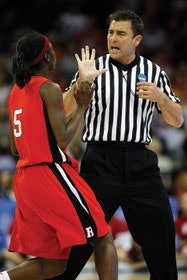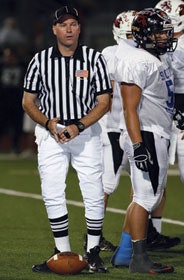The debate over whether referees and umpires should be treated as independent contractors or employees dates back decades, with no resolution in sight.

The local unemployment agency subsequently determined that the Eau Claire Indoor Sports Center should have claimed him and its other officials as regular employees. As a result, Gill and the facility were found to be in violation of state employment laws. But rather than re-filing paperwork for all officials who had worked at the center since it opened two years earlier and back-paying benefits and other employee compensation - which would have cost tens of thousands of dollars - the sports center appealed to the Eau Claire unemployment insurance office. Gill was granted a hearing in front of an administrative law judge to plead her case, and won.
"A decision against our business would have to be enforced against the YMCA, local parks and recreation programs and Wisconsin Interscholastic Athletic Association programs that all operated similarly," says Gill, now an associate with Pinnacle Indoor Sports, a Wisconsin-based consulting and design firm. "It wasn't a legal defense, by any means. But I think the administrative law judge saw there really was no difference between what we were doing and what the other groups were doing. The appeal was won, but the issue obviously didn't die."
Indeed, uncertainty about the way in which sports officials - from high school umpires in California to youth soccer referees in Connecticut - should be classified by the organizations they serve has persisted for decades. Not only must sports administrators choose which officials to hire from a national pool of several hundred thousand, they also need to worry about complying with Internal Revenue Service regulations, state employment laws and other standards regarding injury liability, unemployment compensation and additional issues.
"Those standards are all different," says Alan Goldberger, a sports law attorney at the Clifton, N.J.-based firm Goldberger & Goldberger. "That's what makes this such a confusing area. One agency or court doesn't care what the other one says. All that being said, the most commonly accepted test is: Does the alleged employer have the right to control the manner in which the alleged employee does his or her work? Not does he actually control it, but does he have the right to? With officials, that has usually come down on the side of independent contractor. Nobody really has the right to tell officials what decisions to make during a game or when to blow the whistle."
The National Association of Sports Officials has no formal position on how officials should be classified in the workplace, and the general rule regarding this issue seems to be that there is no general rule.
In simple terms, employers must pay social security contributions and unemployment taxes under federal law on all employees, as well as deduct employee taxes. If, however, they are retaining independent contractors, tax issues may not come into play for the organization or facility because independent contractors are not considered employees for federal tax purposes. Also, several layers of tax and tort liability are removed from organizations that choose to contract with (rather than employ) officials.
According to a NASO "special report" called "Officials & Independent Contractor Status" (available at www.naso.org), the history of determining officials' status dates back to at least 1957. That's when the IRS ruled that college sports officials were employees of an association or conference that selected, trained and assigned officials and required them to file extensive post-game reports. "A college conference is not hiring officials, in most cases, in a manner that resembles in any way, shape or form most of the lower-level officiating arrangements," says Goldberger, a former baseball, football and basketball official and author of Sports Officiating: A Legal Guide, now in its second edition.
Perhaps that's why a decade later, in 1967, the IRS determined that high school sports officials were independent contractors and not employees of their own officials' associations. Although such associations were (and still are) responsible for training officials and assigning games, that was not enough to make them employees, the IRS determined.
What the IRS rulings fail to clarify is whether amateur officials always are considered independent contractors in their relationships with schools, teams, leagues, governing bodies and other organizations that require their services.
Part of the problem is that sports officials are "hybrids" when it comes to matters of classification, Goldberger says. They are part-timers with other full-time jobs, and their role with a particular sports entity often is limited to one or two assignments per week. As a result, they don't quite fit the traditional description of either an independent contractor or an employee.
Still, no fewer than 13 states (Alaska, California, Delaware, Florida, Georgia, Idaho, Minnesota, Missouri, Montana, Nevada, New Mexico, Oregon and Virginia) have passed laws classifying sports officials as independent contractors - at least for the purposes of workers' compensation. And in most of those states, a provision in the law stipulates that independent contractor status does not apply to workers' comp claims against a school or other organization when the sports official also is a regular employee of that organization.
Independent contractor status prohibits officials from unionizing and fighting for unemployment benefits, workers' compensation and liability insurance from school districts, recreation departments and other sports organizations. But if they were employees, their employers might limit their officiating activities or have more say in the assignments they choose or refuse.

Not all judges see eye to eye on this issue, as evidenced by a December 2006 ruling from Wisconsin administrative law Judge Daniel O. Wolter and backed by both the state's Department of Workforce Development and the Labor and Industry Review Commission. The Wisconsin Soccer Association recently filed a lawsuit fighting the decision, which forces soccer clubs to offer unemployment compensation insurance for officials, coaches and trainers. If the ruling stands, WSA will have to pay back unemployment compensation contributions (plus interest), as well as make future contributions.
"It would be pretty challenging," Nancy Stolte, then interim executive director of the 7,000-member Milwaukee Kickers Soccer Club, told the Milwaukee Journal Sentinel earlier this year, referring to the prospect of withholding payroll deductions. "There are hundreds of referees around the state, and trying to keep track of the appropriate taxes for all of them would really be an interesting procedure. Most of the clubs are run by volunteers, and asking volunteers to deduct taxes, well, that is an awful lot to put on them."
In 2006, the IRS condensed the number of factors it uses to determine whether a worker is an independent contractor or an employee - from 20 (Goldberger still often favors the longer list when attempting to classify officials) to these three:
1. Behavioral: Does the organization hiring officials control or have the right to control what a worker does and how he or she does it? Does it provide training or tell officials where to purchase equipment?
2. Financial: Are the business aspects of an official's job - such as payment, expense reimbursements and equipment - controlled by the payer? Can the official realize a profit or incur a loss?
3. Type of Relationship: Are written contracts or such employee benefits as insurance, pension plans or vacation pay involved? Will the relationship continue?
Sports administrators must weigh all three factors when determining whether an official is an independent contractor or an employee, according to the IRS, and while some factors may indicate one classification, others may lean another way. "There is no 'magic' or set number of factors that 'makes' the worker an employee or independent contractor, and no one factor stands alone in making this determination," according to the IRS' web site. "Also, factors which are relevant in one situation may not be relevant in another. The keys are to look at the entire relationship, consider the degree or extent of the right to direct and control, and finally, to document each of the factors used in coming up with the determination."
Confused yet? You're not alone.
Administrators with the Fairfield (Conn.) United Soccer Association were shocked when the IRS handed them a bill in 2004 for $334,441 in back taxes and fines. The highly publicized case was closely watched by youth sports organizations around the country, as the government claimed FUSA failed to withhold taxes for coaches and referees, including minors who worked for $20 a game. The government later reduced the bill for back taxes to a mere $11,600, and FUSA administrators agreed to begin withholding taxes for coaches not employed by professional coaching associations. Officials remained classified as independent contractors.
"Unfortunately, we became the test case," FUSA president Jay Kelton told The New York Times last August, adding that the initial assessment could have put the 45-team league out of business. The Times article also quoted an IRS spokesman, who said the agency had "an important interest in proper classification of workers" and that organizations such as sports leagues sometimes intentionally consider employees as contractors "to avoid paying employment taxes."
Settling such situations expeditiously is in the best interests of everyone involved. A dispute between local umpires and the Victor Valley Union High School District in Victorville, Calif., this spring resulted in Silverado High's varsity, junior varsity and freshman baseball teams missing their first games of the season. For years, the umpires considered themselves independent contractors, wanting to be paid on a per-game basis. District administrators cited IRS regulations that made them believe umpires and other sports officials should be paid as temporary employees and have taxes withheld.
As a result, members of the Victor Valley-Barstow Baseball Umpires Association opted not to sign on with the district for spring baseball and softball, leaving school programs in the lurch. An agreement, at least a short-term one, was eventually reached that continued to pay umpires as independent contractors and helped salvage what could have been a season of home-game forfeits for district teams.
Victor Valley Union High School District superintendent Julian Weaver underscored the confusion that surrounds the issue - even in a state like California, where the law, in many cases, makes officials independent contractors - when he told the Daily Press of Victorville that administrators at other schools "may not know" about their responsibility to the IRS or "may be ignoring it."

In other words, although documentation may state that an official is an independent contractor, the IRS and, if necessary, the courts will be more likely to consider the actual role and responsibilities of that official in the workplace when determining his or her standing.
Most established organizations already have long-held guidelines regarding this issue that likely have not been questioned in the past. "If they're not challenged by anybody, then they go on," Goldberger says. "You never have any way of knowing when there is going to be an initiative to go after people who, in the government's view, are violating the law."
"Our guy filed for unemployment," Gill says about the impetus for the action taken against the Eau Claire Indoor Sports Center. "It could just as easily have been brought up through a worker's compensation claim or sexual harassment suit."
It should be noted that, in 30 years of officiating games at different levels, Goldberger says he never experienced a problem with the way he was classified. In fact, neither have most officials. "The ones who do, tend to make some headlines," he says, adding that no records are kept of when the government makes an assessment or an official files a claim against a sports organization. "There could be a million of 'em. We just have no way of knowing. Most of these cases are amicably resolved in some fashion that does not make the legal books or the newspapers."
So should sports administrators, league managers or facility operators change their ways? Goldberger suggests that while behind-the-scenes contractual considerations are important, focusing on finding the best officials possible should be the top priority. After all, programs are often judged on the quality of their games, which directly correlates to the quality of their officials.
Agreements about payment and other contractual arrangements should come later and usually fall into place naturally, Goldberger says. "From a legal perspective, I think it's a mistake to worry only about taxes or only about workers compensation when you're engaged in any activity," he says. "I think you need to consider how to get the best people to help you run your business."
































